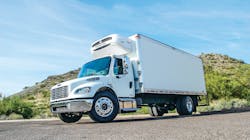Kigali ratification spurs low-GWP refrigerant adoption in U.S.
The United States recently ratified the Kigali Amendment—which calls for a reduction in the consumption and production of hydrofluorocarbons (HCFs)—to the Montreal Protocol on Substances that Deplete the Ozone Layer in a move legislators say is a boon for American companies that are developing HFC alternatives.
Wilmington, Delaware-based Chemours, which provides low-global warming potential (GWP) refrigerants for Carrier Transicold and Thermo King transport refrigeration units (TRUs), is one of those companies. Chemours last month reported record sales in its Thermal & Specialized Solutions segment, which increased sales by $99 million, or 31%, to $417 million in the third quarter; and it’s already expanding its Opteon low-GWP refrigerant production capacity in Corpus Christi, Texas, in an $80 million project announced in July.
“It’s important for the U.S. to be an environmental leader on the world stage, and we at Chemours are supportive of that,” Alisha Bellezza, president of Chemours’ Thermal & Specialized Solutions business, told Refrigerated Transporter. “We’ve been supporting ratification of Kigali since the inception of this company [in 2015]. We think it’s the right thing to do for the planet to reduce global warming-impact products coming into the marketplace, and we have new technologies that can meet the needs. They’re on par, or in some cases better, in terms of performance, efficiency, and energy conservation in the equipment.
“So it makes sense for us to transition as a country and we’re here to help our customers do it smoothly.”
See also: Chemours advances sustainable TRU refrigerant technology
The State Department said Kigali ratification ensures the U.S. remains “a global leader in development, manufacturing, production, and deployment of HFC alternatives.” Industry estimates indicate ratification by the U.S. will support 33,000 new manufacturing jobs, and generate $12.5 billion in new investments in the U.S. economy over the next decade as companies transition to low-GWP technologies.
TRU transition underway
Thermo King this week announced that R-452A—the low-GWP alternative to R-404A developed by Chemours and Honeywell—now will come standard in single- and multi-temperature TRUs for straight trucks manufactured in North America. The company made R-452A an option on Precedent trailer units in January.
“This is another step forward in helping customers meet both current and future regulations,” said Chris Tanaka, vice president of product management for Thermo King Americas.
“Switching to R-452A refrigerant will reduce direct CO2 emissions by nearly 50% per unit, which can potentially add up to significant reductions quickly depending on fleet size. Thermo King is committed to offering progressive options that meet our customers’ unique sustainability goals.”
The new refrigerant is available with Thermo King’s T-Series of large self-powered truck refrigeration units for Classes 5-7, as well as its larger-capacity, direct-drive V-Series truck TRUs for Classes 1-4, which offer frozen and deep-frozen setpoints.
Meeting low-GWP demand
Bellezza called replacing R-404A with R-452A an “easy swap” from a TRU equipment standpoint, and for servicing. “There’s very little difference a technician is going to see in the field, so it’s easy to use,” she said. “That helps adoption, which will ramp up over time.” Particularly since it’s a simple path to meeting sustainability goals now. “For companies that want to reduce Scope 1 emissions, this is an easy way to do it,” she added.
See also: Carrier Transicold to standardize ‘new-gen’ refrigerant
The company’s Corpus Christi expansion will ensure the supply of low-GWP Opteon products for transport refrigeration, as well as automobiles, residential and commercial air conditioning systems, and cold storage. Chemours’ new XL41 refrigerant for residential ACs, which provides a “significant carbon footprint reduction” from R-410A, Bellezza said, recently claimed a 2023 AHR Expo Innovation Award in the cooling category.
“We’re going to increase our capacity by about 40% through a combination of the investments and agile efforts we’ve got going on,” Bellaza concluded. “We expect that to be fully operational in 2025, but work already is underway to unlock that capacity, and under AIM-directed EPA rules for HFC phasedowns, it’s important that we have enough product to satisfy market needs, which are going to increase over time here, especially as the stepdowns take place.
“And a big one is coming up in 2024.”
About the Author

Jason McDaniel
Jason McDaniel, based in the Houston TX area, has nearly 20 years of experience as a journalist. He spent 15 writing and editing for daily newspapers, including the Houston Chronicle, and began covering the commercial vehicle industry in 2018. He was named editor of Bulk Transporter and Refrigerated Transporter magazines in July 2020.


